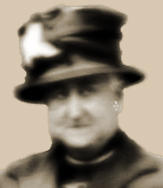The droghte of March
It has recently come to Lady Bracknell's attention that there exists a blog suitable for those readers who find her ladyship's own prose style to be somewhat too modern and avant garde for their linguistic tastes: Geoffrey Chaucer has joined the blogosphere!
There has, perforce, been a considerable gap between the publication of the Canterbury Tales and Mr Chaucer's current work, but Lady Bracknell is pleased to note that the gentleman in question has lost none of his wit or sense of mischief during the intervening centuries. Indeed, she would go so far as to say that Mr Chaucer demonstrates an admirably sprightly intellect for one of his advanced years.
Lady Bracknell's own familiarity with Mr Chaucer's earlier works is, she is ashamed to admit, limited to the prologue to the Canterbury Tales and the Pardoner's Tale, both of which formed part of her A level English literature syllabus.
At Lady Bracknell's alma mater, the A level English course was in the hands of two very different teachers. Miss M, a spinster of desiccated appearance, woollen cardigans and uncertain age, was exceedingly uncomfortable with any literary references to bodily functions or worldly lusts. Whilst her preferred texts therefore consisted of anything written by either Jane Austen or John Donne, she could, if the need arose, extend her scope to the works of Mr Shakespeare, as long as she had the option to gloss over anything unseemly or unhygienic.
(Miss M chiefly concerned herself with the school library. Lady Bracknell remembers as though it were yesterday the occasion on which Miss M explained the correct way to turn the pages of a library book. This feat can indeed be accomplished without any danger of soiling the page one wishes to turn. But not, in Lady Bracknell's opinion, without a concomitant reduction in the pleasure one might otherwise derive from actually reading the book.)
Mr G, on the other hand, revelled in the seamier side of the literary classics to a rather disturbing degree. When introducing the character of Edmund in King Lear, for instance, he was noticeably disappointed to be cheated of his opportunity to explain in enthusiastic detail what a bastard is when the entire Lower Sixth English class admitted that they were already well-acquainted with the dictionary definition.
As Miss M would very likely have succumbed to a fit of the vapours had she been called upon to provide an exegesis of the more vulgar aspects of Mr Chaucer's work, it fell to Mr G to cover that part of the syllabus. Unfortunately, Mr G combined a high degree of confidence in his ability to pronounce Chaucer's English correctly with a rather ill-fitting set of dentures. With the result that, as the young Lady Bracknell, being something of a "swot", sat in the front row of his lessons, her memories of studying Chaucer are forever marred with the recollection of being covered in a fine spray of saliva.
Her own experiences of Chaucer aversion therapy during her formative years notwithstanding, Lady Bracknell is pleased to recommend the literary giant's blog to her readers.
There has, perforce, been a considerable gap between the publication of the Canterbury Tales and Mr Chaucer's current work, but Lady Bracknell is pleased to note that the gentleman in question has lost none of his wit or sense of mischief during the intervening centuries. Indeed, she would go so far as to say that Mr Chaucer demonstrates an admirably sprightly intellect for one of his advanced years.
Lady Bracknell's own familiarity with Mr Chaucer's earlier works is, she is ashamed to admit, limited to the prologue to the Canterbury Tales and the Pardoner's Tale, both of which formed part of her A level English literature syllabus.
At Lady Bracknell's alma mater, the A level English course was in the hands of two very different teachers. Miss M, a spinster of desiccated appearance, woollen cardigans and uncertain age, was exceedingly uncomfortable with any literary references to bodily functions or worldly lusts. Whilst her preferred texts therefore consisted of anything written by either Jane Austen or John Donne, she could, if the need arose, extend her scope to the works of Mr Shakespeare, as long as she had the option to gloss over anything unseemly or unhygienic.
(Miss M chiefly concerned herself with the school library. Lady Bracknell remembers as though it were yesterday the occasion on which Miss M explained the correct way to turn the pages of a library book. This feat can indeed be accomplished without any danger of soiling the page one wishes to turn. But not, in Lady Bracknell's opinion, without a concomitant reduction in the pleasure one might otherwise derive from actually reading the book.)
Mr G, on the other hand, revelled in the seamier side of the literary classics to a rather disturbing degree. When introducing the character of Edmund in King Lear, for instance, he was noticeably disappointed to be cheated of his opportunity to explain in enthusiastic detail what a bastard is when the entire Lower Sixth English class admitted that they were already well-acquainted with the dictionary definition.
As Miss M would very likely have succumbed to a fit of the vapours had she been called upon to provide an exegesis of the more vulgar aspects of Mr Chaucer's work, it fell to Mr G to cover that part of the syllabus. Unfortunately, Mr G combined a high degree of confidence in his ability to pronounce Chaucer's English correctly with a rather ill-fitting set of dentures. With the result that, as the young Lady Bracknell, being something of a "swot", sat in the front row of his lessons, her memories of studying Chaucer are forever marred with the recollection of being covered in a fine spray of saliva.
Her own experiences of Chaucer aversion therapy during her formative years notwithstanding, Lady Bracknell is pleased to recommend the literary giant's blog to her readers.











7 Comments:
No worldly lusts in John Donne? Had Miss M never read "To his Mistress Going to bed" & did she not know the meaning of the phrase "Country Matters"? The man is positively seething with carnal desires, & therefore quite unsuitable for teenaged girls.
Mr Chaucer writes very well for someone so long deceased.
Miss M had a truly remarkable capacity for sanitising literary works in her own mind.
In retrospect, Lady Bracknell suspects that Miss M was probably one of life's true innocents.
Thank you for introducing me to this blog.
How does one properly turn pages of library books? I was never taught any such technique.
I had the honor of encountering a rarity in a local library - an old tome of Herman Melville's Pierre with some pages still uncut!
Reverent bibliophile that I am, I could not bring myself to cut any. Let those pages go unread for another hundred years!
The recommended technique is perhaps not easy to explain without Miss M's flair for live demonstration. But Lady Bracknell will do her best.
What one must avoid at all costs is the "lazy hand" phenomenon.
When one begins to turn a page, one grasps it by its edge. If one's hand is lazy, however, one lets go of the edge once a certain angle of page elevation has been achieved, and one places all four grubby fingers and a thumb on the reverse of the page one is turning in order to complete the action.
Lady Bracknell is not convinced that Miss M's extreme protectiveness of the books in her care - as evidenced by this nonsensical instruction - was calculated to win over those eleven year olds who were not fond of books to the pleasures of reading.
If one runs a lending library, one needs to be able to steel oneself to the fact that one's books will be borrowed, surely?
So you've only read the General Prologue and the Pardoner's Tale, and you were impressed by the more, um, earthy tone of Geoffrey Chaucer? My goodness. Please go read the Miller's Tale, forthwith.
Lady Bracknell did not say that she was impressed by the more earthy tones of Mr Chaucer's works.
Lady Bracknell is the product of an age when piano legs were covered up for fear that gentlemen's baser desires might otherwise be inflamed by them.
Therefore, whilst not insensible to the linguistic merits of Mr Chaucer's writings, and appreciating that practical jokes involving posteriors may well have been considered highly amusing at the time the Miller's Tale was written, Lady Bracknell's own reading preferences do not extend to subject matters of such vulgarity.
*sigh* This actually helps point up just why I so prefer the medieval period (a thousand years, let me add!) to the Belle Epoque (which is, what, 30 years?). Not just that it can be earthy. Medieval literature encompasses such an incredibly wide range of human existence, experience, of life. You get the earthy and the sublime mixed right up, because, well, that's who we are.
A couple of favorite scenes from Chaucer's "Troilus and Criseyde," describing the process of Criseyde falling in love:
(She earlier says)
"For love is yet the mooste stormy lyf,
Right of hymself, that evere was bigonne;
For evere som mystrust or nice strif
There is in love, som cloude is over that sonne.
Therto we wrecched wommen nothing konne,
Whan us is wo, but wepe and sitte and thinke;
Oure wrecche is this, oure owen wo to drynke." (Book II, 778-784)
(A little later)
"So whan it liked hire to go to reste,
And voided weren thei that voiden oughte,
She seyde that to slepen wel hire lest.
Hire wommen soone til hire bed hire broughte.
Whan al was hust, than lay she still and thoughte
Of al this thing; the manere and wise
Reherce it nedeth nought, for ye ben wise.
A nyghtyngale, upon a cedre grene,
Under the chambre wal ther as she ley,
Ful loude song ayein the moon shene,
Peraunter in his briddes wise a lay
Of love, that made hire herte fressh and gay.
That herkned she so longe in good entente,
Til at the laste the dede slep hire hente.
And as she slep, anonright tho hire mette
How that an egle, fethered whit as bon,
Under hire brest his longe clawes sette,
And out hire herte he rente, and that anon,
And did his herte into hire brest to gon --
Of which she noughte agroos, ne nothyng smerte --
And forth he fleigh, with herte left for herte." (Book II, 911-931)
Of course, I am actually a medievalist in training, so it's possible that I may be highly prejudiced.
--
Angela
Post a Comment
<< Home